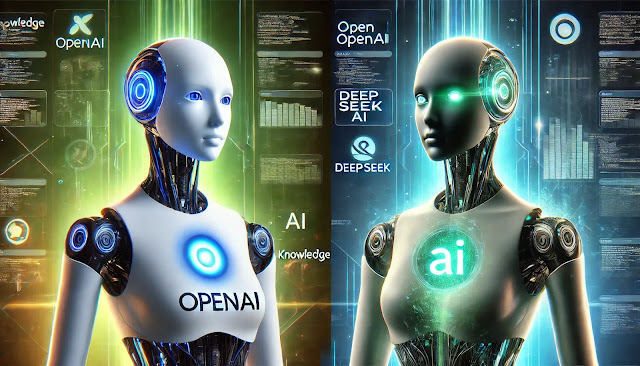Comparing ChatGPT and DeepSeek:
As the field of artificial intelligence continues to evolve, various platforms have emerged, each offering unique capabilities to users. Two such platforms that have garnered attention are ChatGPT and DeepSeek. While both are powered by AI, they cater to different needs and functions. This blog post aims to provide a detailed comparison of these two solutions, highlighting their functionalities, advantages, and potential use cases.
Overview of ChatGPT
Developed by OpenAI, ChatGPT is a conversational AI model designed to facilitate human-like interactions. The system has been trained on a diverse range of text data, enabling it to generate detailed responses, maintain conversations, and assist users in a variety of tasks. ChatGPT excels in natural language understanding, making it a popular choice for applications such as customer service, content generation, and tutoring.
Key Features of ChatGPT:
**Conversational Ability**
ChatGPT can engage in flowing dialogues, making it suitable for applications that require dynamic interaction.
**Content Creation:**
The model can generate articles, blogs, and marketing materials, aiding users in overcoming writer's block or refining their content.
**Versatility:**
From casual chats to technical discussions, ChatGPT adapts to diverse topics, providing valuable assistance across industries.
Overview of DeepSeek
DeepSeek, in contrast, focuses on deep data analysis and search capabilities. This platform is designed to sift through vast amounts of information efficiently, delivering insights and answers rooted in extensive databases. DeepSeek is particularly useful for researchers, analysts, and businesses that need to extract actionable insights from complex data sets.
Key Features of DeepSeek:
- **Data Extraction:**
DeepSeek utilizes advanced algorithms to parse through large data volumes, pulling out relevant information swiftly.
- **Analytical Tools:**
Users can benefit from built-in analytical features that help in visualizing data relationships and trends.
- **Customizable Search Queries:** The platform allows users to tailor their queries, increasing the precision of the results obtained.
Comparison of Use Cases
Interaction and Engagement
**ChatGPT** stands out in scenarios that prioritize user interaction. Businesses looking for a virtual assistant or a customer support agent can leverage ChatGPT's conversational abilities to ensure a seamless user experience.
In contrast, **DeepSeek** shines in data-heavy environments such as market research or academic settings, where users need to conduct deep dives into data without the need for back-and-forth dialogue.
Data Analysis and Decision Making
For organizations that heavily rely on data-driven decisions, DeepSeek provides a powerful advantage. Its ability to analyze large datasets allows users to uncover trends and fact-based insights that can significantly influence strategic decisions.
On the other hand, while ChatGPT can handle some data queries, its primary strength lies in generating narratives and explaining complex topics in an accessible manner, making it less suited for exhaustive data analysis.
Conclusion
Both ChatGPT and DeepSeek offer robust solutions tailored to distinct purposes within the realm of AI. ChatGPT excels in conversational engagement and creativity, making it an ideal choice for applications focused on interaction and content generation. In contrast, DeepSeek is a vital tool for those needing comprehensive data analysis and extraction, particularly within research and analytical functions.
Ultimately, the choice between ChatGPT and DeepSeek will depend on the specific needs and goals of the users. By understanding the strengths of each platform, businesses, researchers, and individuals can make informed decisions on which tool will best fit their requirements.
By understanding the nuances between ChatGPT and DeepSeek, you can harness the potential of AI to enhance productivity and insight generation in your endeavors.


awesome
ReplyDeletePost a Comment
Thank you for your feedback. Stay with us.